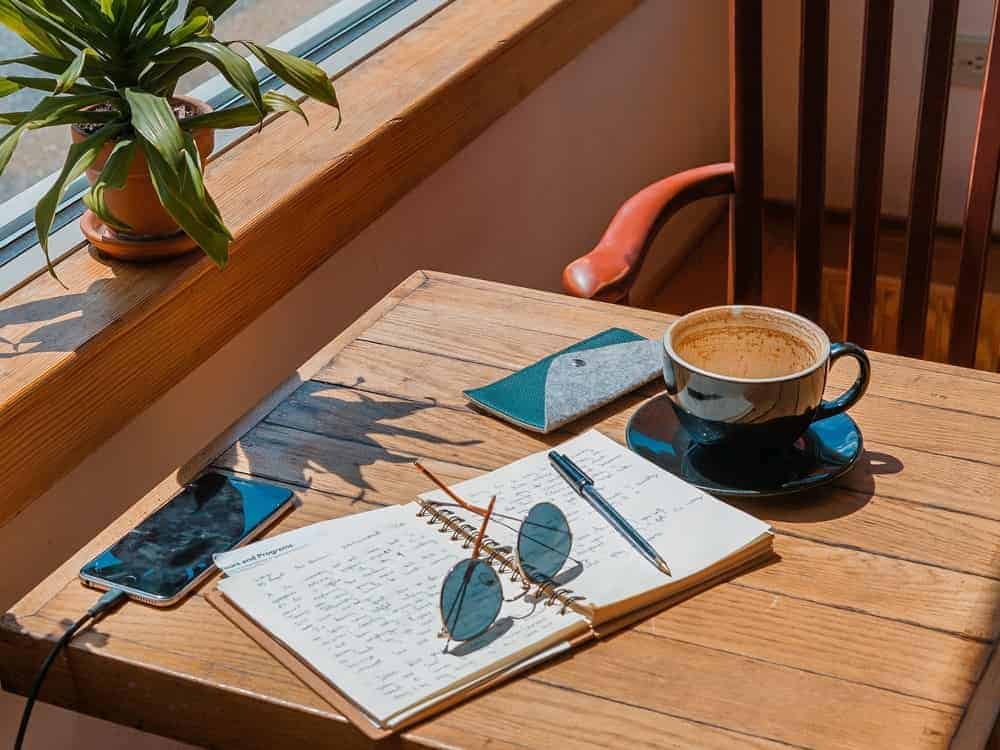Do you ever get that feeling of overwhelming anxiety where your mind is racing? Maybe your stomach is churning or you feel like you’re on the verge of a panic attack. What about something less serious. Like tiny little anxiety butterflies while you ruminate over something that is stressing you out?
As someone who has been plagued with anxiety for years, it took me a long time to realize that those anxiety butterflies are actually curable.
I started researching some of the best ways to scientifically cope with anxiety. In my research I found that the three best ways to cope are: mindfulness, CBT and self care and all you need to start practicing those things is a journal .
Here are 10 ways you can use a journal to help anxiety using those three main coping methods.
10 Ways You Can Use A Journal To Help Anxiety + Prompts
Contents
1. Journaling gives you a new perspective
I mentioned CBT above which stands for cognitive behavioural therapy. CBT doesn’t sound sexy or fun and that is because it’s a complex therapy that has been developed by psychologists and scientists for many years.
Although it can sound overwhelming, the very core of CBT is simple. It reminds us that what we think may true or a reality, isn’t always true or real.
For example, someone might have social anxiety because they feel that they are awkward or unfunny around people. This is what they believe to be true. Yet, a close friend might tell them that they have great jokes and everyone enjoys their company.
You can use your journal to help anxiety by taking your thoughts and beliefs out of your head and onto the paper. When you read your thoughts, it can give you a new perspective. You can see that maybe you are exaggerating, or are believing things that might not be true.
Prompts:
- What are some things I believe to be true about myself?
- If I have negative thoughts about myself, what proof can I give that these thoughts are not true?
2. Allows you to visualize
An excellent mindfulness practice is to picture ourselves in a different place or time. This is often used with the help of guided meditation but can also be expressed through a journal.
Anxiety is something that happens to us because we fear the unknown. Let’s say you are working on a big project at work and it’s giving you anxiety because you’re not sure if you’ll meet the deadline.
Writing down a worst case scenario or and thinking of what you would do in that situation can help your brain realize that you’ve got this under control.
Prompts:
- What is something I am afraid of?
- What is the worst thing that would happen to me if I were to face this fear?
3. It’s is a release of energy
We don’t usually think of our thoughts as taking up energy but they totally do! Have you ever felt mentally exhausted? Of course you have!
Our thoughts take up energy and anxious thoughts are even more taxes on the brain. When we write our thoughts down on paper, we give our brain a little break because the thought can live on it’s own on the page.
For example: Let’s say you’re replaying a scenario in your head over and over again. If you write that scenario down on paper, you can read the scenario instead of thinking about it. This actually gives your brain a little rest because you’re not re-creating the thought, you’re simply reading it.
Writing is a great way to give a racing brain a moment to relax.
Prompts:
- What thoughts do I play in my head on repeat?
- Write down everything that comes to your head, without filtering.
4. Journaling helps your creative side
According to an amazing study brought to my attention by Psychology Today, journaling brings out your creative side.
“Journaling requires the application of the analytical, rational left side of the brain; while your left hemisphere is occupied, your right hemisphere (the creative, touchy-feely side) is given the freedom to wander and play (Grothaus, 2015). Allowing your creativity to flourish and expand can be cathartic and make a big difference in your daily well-being.
By letting your creative side take the driver seat, you can be in touch with the emotions and feelings that cause your brain to feel inspired and motivated.
This is so much better than stimulating the parts of your brain that are responsible for insecurity, stress and fear which is what our anxious thoughts often do.
Prompts:
- If you could create a happy place, where would it be and what would be in it?
- Draw out what it feels like to be happy
5. Helps you organize
When your thoughts are left to their own accord, they can start going crazy! Left to their own devices, they can pop into your head at any time making your brain filled with worries, things that need to get done and stress about consequences.
You can use a journal to help anxiety by writing things down to help straighten those thoughts out. You can make to-do lists and priority lists so that your brain isn’t responsible for holding all that information.
When you organize your thoughts on paper, things start to look a lot easier to accomplish and this greatly reduces stress and anxiety.
Prompts:
- Make the easiest to do list ever. Finish all the tasks and cross things off the list when they’re done
- Make a list of everything you need to do tomorrow. Then cross off half of the things that can wait.
6. Journaling can help you feel grateful
A mindfulness practice that greatly helps soothe anxiety is gratitude. When you practice gratitude, you start to see the things that you might have been taking for granted.
Many of us live amazing lives but we tend to forget how awesome they are and instead focus on every little thing that might be going wrong.
Using a journal to write things that you feel grateful for can help give you a new appreciation for your current life.
Prompts:
- What are 5 things that you may be taking for granted?
- Make a list of 10 things you are thankful for.
7. It helps you stay present
Anxiety is a fear of the future. It is a fear that we will enter a future that gives us displeasure, discomfort or humiliation.
When we are anxious, we are not living in the present. Mindfulness is the art of living in the present and using a journal to stay present is extremely effective.
When you write your thoughts down on paper, they enter the “real” world. The thoughts in our head are very abstract and don’t really carry much weight in the real world unless we write them down or speak them out loud.
Writing your thoughts down can help you see them for what they’re really worth and remind you that in this current moment, sitting there writing in your journal – you are safe.
- What are some things that you can see, hear, feel or smell right now?
- What do I want to take out of my head and put on this paper?
Psst. You may be interested in my FREE self care challenge. Click here for more info.
8. Writing can break down your fears
Much like staying present, seeing your fears in black and white can make them a lot easier to cope with.
Journaling allows you to break those fears down and get to the root of the problem.
For example, let’s say you have started feeling anxious about being a new mom. You might list a fear as:
- I am afraid of not being a good mom.
With journaling, you can break that fear down by asking yourself questions like:
- What does “not being a good mom” mean to me? What have I done that would be considered not being a good mom? How can I ask for help or lighten my workload so that I can be a better mom?
By taking your anxious thoughts or fears and putting a microscope on them, you take away the abstract fear and replace it with solutions and tasks.
9. It helps get you in touch with your “other you”
We all have two versions of ourselves. One version lifts us up. This version has goals, dreams, expectations. This version of ourselves gets up early, works really hard and is always motivated.
Then we have the other version. This version doubts our abilities, reminds us of our insecurities and wants to curl up in bed and never get out.
We can use journaling to help our anxiety by getting in touch with both of these versions of ourselves. The more we express our insecurities and doubts on paper, the more the positive version of ourself decides to step in and change the tone.
Prompts:
- What are some things that are holding me back in life?
- What can I do to make those things have less of an impact?
10. Journaling helps you take action
When you write down goals or positive thoughts, you are more likely to start taking action on those things. Goals that are written down are more concrete and tangible, your brain starts to see those as “real tasks” that need to get done.
Most of us have anxiety triggers. These are situations or environments that trigger our anxiety the most. The more we can pinpoint these triggers and find ways to help overcome them, the easier it will be to live in the world with an anxious brain.
Writing down is taking an action and the more action we take towards reaching our goals, the easier it will be to get there.

